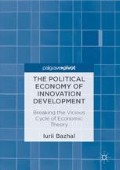Abstract
This chapter analyses the role and place of Schumpeter’s innovations in the categorial system of the economic theory; it is substantiated of its importance in order to recognize the subject of Political Economy as the doctrine on the Wealth of Nations. It is shown that over time the country’s absolute economic wealth was lost as the main subject in Economics. The chapter shows that phenomenon of innovation did not acquire the status of a key scientific category in the formation of new theories and remained as the visible invisible factor of development. The technological innovations not only changed the course of economic history; they also have been changing mainstream economic theories.
Access this chapter
Tax calculation will be finalised at checkout
Purchases are for personal use only
References
Acemoglu, D., and J.A. Robinson. (2012). Why Nations Fail: The Origins of Power, Prosperity and Poverty. London: Profile Books.
Aslund, A. (2012). How Capitalism Was Built: The Transformation of Central and Eastern Europe, Russia, the Caucasus, and Central Asia. 2nd Edition. Cambridge: Cambridge University Press.
Auty, R.M. (2001). Resource Abundance and Economic Development. Oxford: Oxford University Press.
Bacon, F. (1605). “The advancement of learning, by Lord Bacon”. (New York: P.F. Collier and Son, 1901), EIGHTH BOOK, Ch. III. Access. http://oll.libertyfund.org/titles/1433.
Bazhal, I. (2012). Postindustrial challenges for the economic eurointegration of Ukraine: The problems of regional convergence. Convergence Economies of Ukraine and European Union: Problems and Perspectives. Kyiv: University Publishing House PULSARY. 5–12. (in Ukrainian).
Bray, F. (1986). The Rice Economies: Technology and Development in Asian Societies. Oxford; New York: Blackwell.
Carayannis, E., and C. Sipp. (2006). e-Development Toward the Knowledge Economy Leveraging Technology, Innovation and Entrepreneurship for “Smart” Development. UK: Palgrave Macmillan.
Chang, Ha-Joon. (2007). The East Asian Development Experience: The Miracle, the Crisis and the Future. London, United Kingdom: Zed Books.
Drazen, A. (2000). Political Economy In Macroeconomics. Princeton, N.J.: Princeton University Press.
Evonomics. The next Evolution of Economics. (2016). – http://evonomics.com/.
Finland as a Knowledge Economy 2.0 Lessons on Policies and Governance. (2014). Washington, D.C.: World Bank Publications.
Gregory, Mankiw, N. (2013). Macroeconomics. 8th edition. New York: Worth Publishers. Ch. 10.
Groenewegen, Peter. (2008). “Political economy”. In The New Palgrave Dictionary of Economics. Second Edition. Eds. Steven N. Durlauf and Lawrence E. Blume. London: Palgrave Macmillan. 904–07.
Hannula, H., S. Radosevic, and N. Tunzelmann. ed. (2006). Estonia, the New EU Economy: Building a Baltic miracle? Aldershot, UK: Ashgate Publishing.
Ito, T., and A.O. Krueger eds. (1995). Growth Theories In Light Of The East Asian Experience. Chicago: University of Chicago Press.
Keynes, John Maynard. (1936). The General Theory of Employment, Interest and Money. New York: Harcourt, Brace.
Kolodko, G. W. (2011). Truth, Errors, and Lies: Politics and Economics in a Volatile World. Columbia University Press; Kolodko, G. W. (2000). From Shock to Therapy: The Political Economy of Postsocialist Transformation (UNU/WIDER Studies in Development Economics). The United Nations University, Oxford University Press. New York: Oxford.
Kolodko, G. W. (2011a). 20 Years of Transformation: Achievements, Problems and Perspectives (European Political Economic and Security Issues). New York: Nova Science.
Kondratiev, N. (1925). The Static and Dynamic View of Economics. Quarterly J. of Economics, 39: 575–83.
Landes, D. S. (1999). The Wealth and Poverty of Nations: Why Some Are So Rich and Some So Poor. New York: W.W. Norton.
Lee, K. (2013). Schumpeterian Analysis of Economic Catch-up: Knowledge, Path-Creation, and the Middle-Income Trap. Cambridge: Cambridge University Press.
Malthus T. R. (1798). An Essay on the Principle of Population. Oxford World’s Classics reprint: xxix Chronology.
Marshall, A. (1890). Principles of Economics. Eight Edition. London: Macmillan and Co.
North, D. C. (2005). Understanding The Process Of Economic Change. Princeton, N.J.: Princeton University Press.
Okun A.M. (1992). “Potential GNP: its measurement and significance”, in Proceedings of the business and economics statistics section, American statistical association. Washington, D.C.: American Statistical Association: 98–103.
Perez, C. (2002). Technological Revolutions and Financial Capital: The Dynamics of Bubbles and Golden Ages. Cheltenham: Edward Elgar Publishing.
Phelps, E. S. (2013). Mass Flourishing: How Grassroots Innovation Created Jobs, Challenge, and Change. Princeton, N.J.: Princeton University Press.
Pigou, A. C. (1924). The Economics Of Welfare. London: Macmillan and Co.
Reinert, E. S. (2007). How Rich Countries Got Rich– And Why Poor Countries Stay Poor. New York: Carroll & Graf.
Sachs, J.D., and A.M. Warner. (1999). The big push, natural resource booms and growth. Journal of Development Economics 59: 43–76:
Schumpeter, J. A. (1983[1934]). The Theory of Economic Development: An Inquiry Into Profits, Capital, Credit, Interest, and the Business Cycle. New Brunswick, New Jersey: Transaction Publishers.
Senor, D., and S. Singer. (2009). Start-up Nation: The Story of Israel’s Economic Miracle. New York, NY: A CFR Book. Twelve Books.
Smith, A. (1993). An Inquiry into the Nature and Causes of the Wealth of Nations. A Selected Edition /Edited with an Introduction and Notes by Kathryn Sutherland. New York: – Oxford University Press, Oxford.
Snowdon, Brian, and Howard R Vane. (2005). Modern Macroeconomics: Its Origins, Development, and Current State. Northampton, Mass: Edward Elgar.
Stiglitz, J. E. (2002). Globalization and its Discontents. New York: W.W. Norton & Company.
Stiglitz, J.E. (2014). Leaders and followers: Perspectives on the Nordic model and the economics of innovation. NBER Working Paper No. 20493
Stiglitz, J.E., and S. Yusuf. eds. (2001). Rethinking The East Asian Miracle. Washington, D.C.: World Bank.
Torvik, R. (2002). Natural resources, rent seeking and welfare. Journal of Development Economics 67(2): 455–70.
Tracy, M. (1993). Food and Agriculture in a Market Economy. La Hutte (Belgium): APS (Agriculture Policy Studies).
Williamson, J. 1989. What Washington means by policy reform. In John Williamson ed. Latin American Readjustment: How Much has Happened. Washington: Institute for International Economics.
Author information
Authors and Affiliations
Rights and permissions
Copyright information
© 2017 The Author(s)
About this chapter
Cite this chapter
Bazhal, I. (2017). “Vicious Cycle” of Political Economy Without “Innovations”. In: The Political Economy of Innovation Development. Palgrave Macmillan, Cham. https://doi.org/10.1007/978-3-319-54852-4_4
Download citation
DOI: https://doi.org/10.1007/978-3-319-54852-4_4
Published:
Publisher Name: Palgrave Macmillan, Cham
Print ISBN: 978-3-319-54851-7
Online ISBN: 978-3-319-54852-4
eBook Packages: Economics and FinanceEconomics and Finance (R0)

